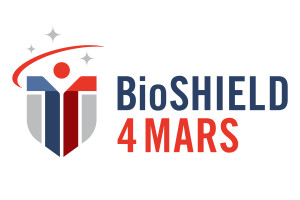BioShield 4 Mars
Addressing

WINNERS ANNOUNCED!
BioShield 4 Mars was a special radiation-focused SMARTCAP grant cycle. Winners have just been announced. Watch the video!
Space video footage courtesy of NASA
Radiation is the #1 health risk facing humans in space. The NSBRI Industry Forum initiated BioShield 4 Mars to address this risk and intends to award at least one $250, 000 grant in 2016. The Industry Forum invited SMARTCAP applications from small U.S.-based companies who have developed or in-licensed countermeasures that have demonstrated promise in protecting healthy tissues from the deleterious effects of ionizing radiation; either conventional (gamma-rays) or space-like (proton, X-ray, and heavy ion). To be eligible to receive a BioShield 4 Mars grant, the company had to provide credible scientific peer-reviewed publications that support the claim that its product is an effective radiation countermeasure or prophylactic.
However, the Industry Forum recognizes that the market for radiation protection is not large enough to attract follow-on funding from investors. Hence, applicants were required to propose an additional indication and provide a rationale and preliminary data to support its potential efficacy and the market opportunity. SMARTCAP funding may then be used to execute key proof-of-concept or other preclinical studies in support of the additional indication. This will de-risk investment opportunities and have the final outcome of delivering a promising product to market for clinical use that is also efficacious for protecting healthy tissues against radiation.
Physical or magnetic shielding from space radiation is not currently feasible, particularly protecting against high-energy galactic cosmic rays (GCR) and unexpected solar particle events (SPEs). Hence, the development and validation of biological countermeasures is an important avenue to protect astronauts against the adverse effects of ionizing radiation during long-duration space travel. Countermeasures and prophylactic compounds (e.g., pharmaceutical or medical foods) must be safe, clinically impactful, and have a long shelf-life in the space environment.
It is possible that products with demonstrated efficacy in terrestrial clinical applications have effective countermeasures against space-like radiation exposure. For example, modified granulocyte colony stimulating factor (G-CSF) was recently approved by the Food and Drug Administration (FDA) as the first (and only) countermeasure against acute radiation injury from a radiological or nuclear accident. Neupogen® was approved for treatment of patients with radiation-induced myelosuppression following a radiological/nuclear incident. A slightly different modified form of this biologic is beneficial in animal models of acute radiation effects from SPE-like protons. Other countermeasures have shown efficacy in animal models in protecting healthy tissues against exposure to ionizing radiation; both conventional (gamma) and space-like radiation (protons and heavy ions).
Ionizing radiation affects a plurality of organ systems. It is highly unlikely that one countermeasure will address all facets of radiation toxicity. Hence, applicants were asked to focus on certain tissue-specific effects. Of particular interest are foods, pharmaceuticals, drinks, or nutraceuticals that protect the gastrointestinal tract, the brain, the lung, the heart, and the immune and hematopoietic systems from insults due to radiation and other environmental influences.





